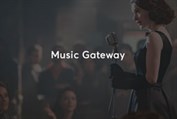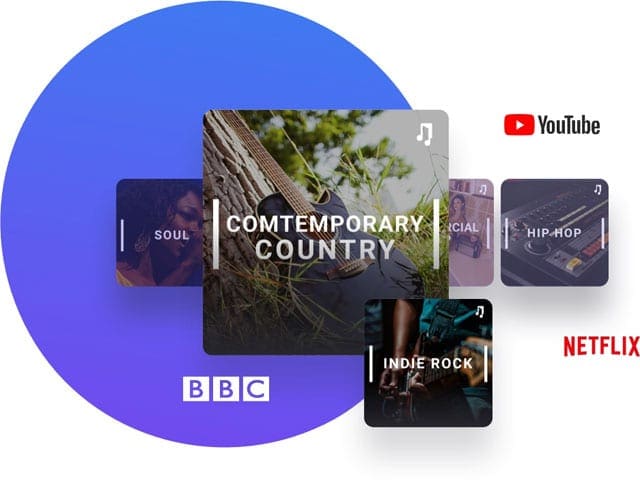Video Games Publishers – How To Get Your Music In Games
The video game industry has survived and thrived the course of history since its conception and arcade days, to modern-day play on mobile phones, games consoles and computers. It is one of the only entertainment industries currently not struggling to adapt to the game-changing internet age.
Music is prevalent in nearly every element of our lives at the moment, especially in entertainment and visual media. The gaming industry is credited for helping the music industry survive the pirating trends in the 00s and now is opening up more and more sync licensing opportunities for composers and artists alike. There is such a demand for it, that games composers are now being asked to perform their compositions live for audiences in their thousands in cities such as London and Toyko.
If you’re a musician looking to get your music heard, video games are widely considered one of the most effective and projective platforms for music promotion. In this post, we’re going to look at how you can make that happen.
Who Are Video Game Publishers And What Do They Do?
A video game publisher works similarly to any other form of a publishing company in the entertainment sector; they develop, produce, market and distribute video games commercial release. It’s a huge industry, the research company Newzoo predicts the video game industry could be worth just over $180 billion by 2021. Tencent is the market leader in the global gaming industry, alongside other major gaming publishers such as Activation Blizzard and Sony.
As you’d imagine, a vast amount of market research goes into video game production. Due to the rising advances in the technology company has access to, games studios can be incredibly expensive to produce, let alone to market. It can take a couple of years to develop a game engine, therefore the publishing company must be confident it will appeal to commercial markets at the time of release. The video game industry has become rather hit-driven, with sales for video games spiking during the Christmas selling season.
Top video game publishers are responsible for the conception of new games, the development of those ideas, the funding for their production and then finally their manufacture and release. There are often big marketing budgets as the publishers need to see a financial return for the large investment they have made in the game’s development. In this respect, many game publishing ventures are considered risky.
Large publishing companies will likely have their own manufacturing and distributing companies, whereas indie game publishers will work with distributors or larger publishers to carry out this element of their business.
External Development & Studio Development
Video game companies publish games through either external games developers or internal production teams.
External development is how publishers refer to projects that are being produced outside of their own publishing company. Often a publisher will finance an external project through development, paying the developers when they’ve reached certain milestones in the production of the game. Publishers may outsource game development in this way to harness an indie game company’s expertise. External developers may be contracted to develop sequels to their games by the publishers if their first product is a commercial success.
Studio development refers to projects handled in-house by the publishers own development team. All the top games companies will have large studio teams responsible for creating some of their best selling products. In-house development allows for a clearer and more frequent inspection of the game production process.
Music In Games
Music has been used during gameplay since the 1970s and the arcade games era. At the time, game music mainly consisted of basic melodies produced on early synthesisers. This style became known as “chiptunes” and is still associated with vintage arcade-era games.
By the 1990s, video game soundtracks were becoming just as iconic as the gameplay themselves. For many, it was a way of discovering new music and expanding your knowledge of musical genres. In the last twenty years, gaming soundtracks have rivalled TV and film soundtracks and scores for their orchestral compositions and music licensing deals. Nowadays, video games can feature the music of any genre and publishers begin working on their soundtracks a year in advance of release.
For artists and composers, this has been game-changing, (excuse the pun). While sync licensing opportunities may be hard to come by in the TV and film industry, game soundtracks can be easier to secure and more effective in projecting your career some experts are saying. Developers are interested in both original compositions and pre-existing commercially released tracks for their games, so whether you’re an artist or a composer there could be an opportunity for you.
What Are The Benefits?
First and foremost, anything that gets your music heard by new audiences is a good thing. Games can offer exposure for your music nationally and globally, just imagine how many more listeners that can bring in for you. It could take months, if not years, to generate that much successful music promotion as an artist. Gaming is where many find new music in genres they love or completely new ones.
You can’t really put a price tag on exposure, but game soundtracks can bring in revenue for you too. If you’re composing, an original score for a video game will sometimes offer a buy-out for the music or a commission for writing it. For pre-existing tracks, commercial or production, sync fees are often agreed for the license, and depending on the agreement, can generate royalties too.
Exposure and income? Seems like a good deal.
Getting Your Music In Games – Supervisors and Developers
We’ve mentioned supervisors and developers throughout this post, but how do you actually get your music in a game?
Starting at the beginning, the game designer(s) will have an idea of what style of music they want to accompany the gameplay. Depending on the size of their operations, they may take charge of music sourcing themselves, or they may hire outside help from a music supervisor. Some larger publishing companies may have in-house supervisors or may employ regular freelancers.
Supervisors are experts in sync deals and what music suits what project. They are well connected to publishers, production libraries and entertainment industry professionals. They find music appropriate for the project and then manage the legal agreements with the rights holders in order to legally license the track.
Sourcing Pre-existing Tracks
For some games, it may be appropriate to source a song that has already been released for commercial release. If you’re an artist looking for sync opportunities, speak to your publisher about getting your music in video games. Your publisher should have connections to music supervisors and influential figures in the entertainment industry, increasing your chances of securing a sync deal. Music supervisors first port of call for sync pitches is their networks of publishers.
Alternatively, if a supervisor is looking for backing music or a score, they could turn to production libraries they have relationships with. If you’re a composer, getting your music published by a production library can open up countless opportunities for your tracks throughout their lifetimes.
Sourcing Original Compositions
Fast becoming a trend in the game development world, is the sourcing of original scores as it adds to the exclusivity of a game. Composers may be contacted by previous connections of developers or supervisors, or they can submit pitches to developers directly. For some projects, simple instrumentals may be all that is required, whereas others may inspire large, orchestral scores. It will be the composer’s job to write the score and produce the recording, so it helps composers to be skilled in producing music as well as writing it.
Licensing Agreements And Payments
Before a track can be licensed to accompany visual media, the appropriate sync license must be agreed upon. This is a negotiation that is usually determined by a music supervisor representing the interested party, and a music publisher who represent the rights holders of a piece of music.
Sync deals can vary greatly and the terms are dependent upon a number of factors, such as the use and presence of the music in the final context of the media, the commercial success of the track, the reputation of the parties involved and the budget of the licensing party. In most cases, a one-ff sync fee will be agreed upon, known as a sync fee, and then the rights holder’s entitlement to royalties will also be determined. Some sync deals in the games industry offer royalty payment but not all, it depends on the agreement.
When a composer has been contracted to produce a piece of score for a video game, they will usually be offered a buy-out for the rights to the music. This is a one-off payment and even if the game does fantastically commercially, the composer is not entitled to anymore pay. If you’re a composer, you’ll likely have signed a few licensing agreements. If you’re not sure the agreement benefits you as it should, consider seeking legal advice before signing away your rights.
Successful Pitching
If you’re a musician or composer operating without publishers, do not fret, you can still submit music to game developers and music supervisors for projects. As this is the first contact you’ll have with the individual or team, you need your pitch to be successful. While it’s always important to aim high, be realistic in who you approach. If you’re a composer having written your first piece of the score in your bedroom, it’s unlikely you’ll be chosen for the latest Nintendo game. Set your sights on attainable goals to increase your chances of success.
When you write your email, make it human, polite and efficient. A supervisor isn’t likely to read a 14 paragraph email about how you admire their work and what your music means to you. Give a quick introduction to your music, listing the genre, mood and why it’s relevant to their project. Be human, authentic and concise.
Have an easily accessible link to your music on a streaming platform or Soundcloud. Supervisors generally don’t like having to download music they might not use and it saves time for everyone involved. Also, only submit tracks that are finished and to a high standard. Supervisors and developers want tracks that are ready to be synced immediately.
Include all of your contact information and all the metadata with your music. This makes the supervisor’s job easier when it comes to drawing up the license as they have all of the relevant rights holder information and know who to contact.
Finally, do your research. Do not email every single supervisor you can find or developer, chances are your music won’t be relevant to half of them and your email will go straight into the trash folder. Research professionals work whose mirror your own and target your approach. Just as importantly, do not send the same email to everyone you contact. Generic emails can be spotted a mile away and that two minutes more effort it takes to personalise it can make all the difference.
If you’d like to get your music in a video game and are considering sync licensing opportunities, you can submit your demos here or check out our Global Creative Marketplace for existing projects.
FAQ Section
Q. How many game publishers are there?
There are an estimated 2,500 active game companies in the United States with them occupying close to 3,000 locations. The numerous game companies are located in all 50 states. There is an estimated 65,000 employees working in the United States within the video game industry.
Q. What is the biggest video game company?
Here’s a list featuring the very best and biggest video game companies
- King
- Electronic Arts
- Apple
- Activision Blizzard
- 2K
- Microsoft
- Sony PlayStation
Q. What is the difference between a game publisher and developer?
A developer will be the person (s) that code, create and develop the game. Whereby the video game publishers will be responsible for all aspects of marketing, selling and monetizing the game as a project in the marketplace. Large games publishers will normally develop games in-house, as well as acquiring, commissioning and licensing games from third-party developers, including indie developers.
Q. What game has made the most money?
- Space Invaders ($13.9 billion)
- Pac-Man ($12.8 billion)
- Street Fighter 2 ($10.6 billion)
- World Of Warcraft ($8.5 billion)
- CrossFire ($6.8 billion)
- Wii Sports ($6 billion)
- Lineage ($5.7 billion)
Q. What is the richest gaming company in the world?
Here is a list of the top 10 richest video game companies and their estimated wealth.
- Microsoft Studios $37billion
- Sony Computer Entertainment $17.5 Billion
- Activision Blizzard $16.3 Billion
- Nintendo $14.5 Billion
- Electronic Arts $12 Billion
- Sega $3.4 Billion
- Ubisoft $1.61 Billion
- Square Enix $1.45 Billion
Q. What does a games publisher do for video games?
What does a game publisher do exactly, I hear you ask? A game publisher will invest and fund the development of a video game, handling the marketing and release schedule and advertising of the game. This includes video game trailers to help promote the release and secure a large sales return on their investment. In some cases, this can cause tension between the original developers and creators of the game and the marketing appeal vs the artistic freedom of the creators.
Q. What do software publishers do?
Software companies, don’t always publish and promote the games they create. These software companies hire software developers who are involved in all aspects of creating and producing the game using computer sciences software and dedicated software frameworks and programs. This includes designing, project management, documentation, installation tools, game content, artwork, UI and gameplay. They don’t normally handle the support services to the customers, which can be outsourced.
Q. How do I start my own game company?
- Get a business plan together. This is key to your success
- Form a legal entity such as a limited company or corporation (inc) in the states
- Get an accountant and legal representation for your business
- Open a business bank account
- Get business public liability insurance
- Create your brand name and design (logo)
- Create a website with at least your contact details and a blog to drive interest and data capture from visiting customers for future marketing
- Raise finance or work out how you are going to deliver the game development with the resource you have
- If you are looking to get your game published by a third party company, start building those relationships through a networking event, trade associations and conferences.
























